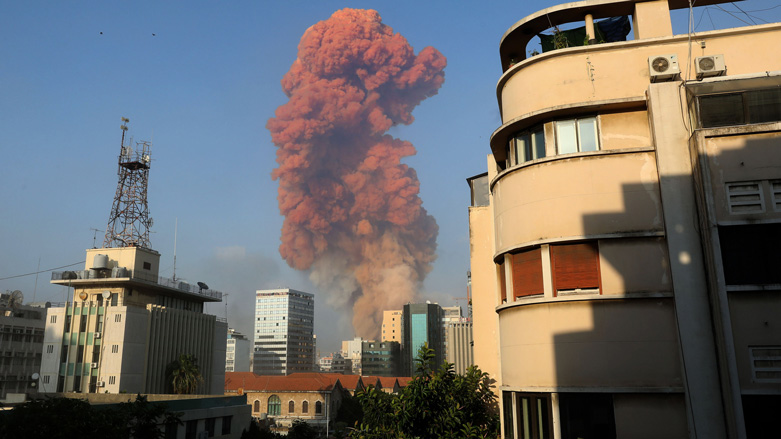As huge explosion rocks Beirut, KRG extends condolences and US offers assistance

WASHINGTON DC (Kurdistan 24) – A massive explosion in the port of Beirut rocked the Lebanese capital late on Tuesday afternoon. The blast was felt for tens of kilometers and seismic activity was recorded as far away as Cyprus.
According to Lebanon’s Ministry of Health minister, over 60 people have been killed and nearly 3,000 injured, although those numbers are expected to rise. Nazar Najarian, the head of the Lebanese Kataeb Party (known in English as the Phalange Party) is among those who died in the explosion.
The cause of the blast is unclear, although some Lebanese officials suggested it had been caused by confiscated explosives seized years ago that were kept at the port.
Lebanon’s Prime Minister, Hassan Diab, said the explosion was caused by dangerous chemicals that had been stored there for the past six years, despite warnings from port officials that the material was unsafe.
“I promise you that this catastrophe will not pass without accountability,” he vowed in a speech broadcast on Lebanese television. “Those responsible will pay the price.”
Israel, which has regularly attacked targets in Lebanon that it viewed as threatening, particularly those associated with Iran, firmly denied any role in Tuesday’s blast.
“Solidarity and Support” from KRG
“Our thoughts are with everyone affected by the explosion in Beirut,” Masrour Barzani, Prime Minister of the Kurdistan Regional Government (KRG) tweeted late on Tuesday.
“The KRG offers our solidarity and support to the Lebanese people at this difficult time, along with our condolences to the families of those who died or are injured,” the Kurdish Prime Minister added.
US Offers Assistance
“We are closely monitoring and stand ready to assist the people of Lebanon as they recover from this tragedy,” US Secretary of State Mike Pompeo said in a statement issued late on Tuesday.
“Our team in Beirut has reported to me the extensive damage to a city and a people that I hold dear, an additional challenge in a time of already deep crisis.” Pompeo continued.
“We understand that the Government of Lebanon continues to investigate its cause and look forward to the outcome of those efforts,” he concluded.
The port of Beirut is important to the country for the import of vital supplies, including foodstuffs. But the port has been heavily damaged, and it is unusable in its present condition.
It is unclear how the Lebanese government will deal with that challenge, but it has declared Wednesday to be a day of national mourning.
The explosion brought back memories of Lebanon’s civil war, which lasted for 15 years, from 1975 until 1990. The conflict was ended through the Taif agreement, which was concluded in Saudi Arabia under the auspices of the Arab League.
Some 120,000 Lebanese died in the course of that war, which drew in other parties, including Israel, Iran, and even Iraq, under Saddam Hussein.
Both Israel and Iraq supported the Christian Phalange Party, while Syria and its close ally, Iran after the 1979 revolution, cultivated Shi’ite militias, the most prominent and significant of which emerged as Hizbollah.
Editing by John J. Catherine
